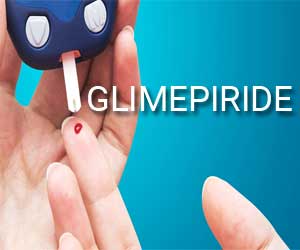- Home
- Editorial
- News
- Practice Guidelines
- Anesthesiology Guidelines
- Cancer Guidelines
- Cardiac Sciences Guidelines
- Critical Care Guidelines
- Dentistry Guidelines
- Dermatology Guidelines
- Diabetes and Endo Guidelines
- Diagnostics Guidelines
- ENT Guidelines
- Featured Practice Guidelines
- Gastroenterology Guidelines
- Geriatrics Guidelines
- Medicine Guidelines
- Nephrology Guidelines
- Neurosciences Guidelines
- Obs and Gynae Guidelines
- Ophthalmology Guidelines
- Orthopaedics Guidelines
- Paediatrics Guidelines
- Psychiatry Guidelines
- Pulmonology Guidelines
- Radiology Guidelines
- Surgery Guidelines
- Urology Guidelines
Diabetes Management: Glimepiride Cardiovascular Safe, says Real-World evidence

Despite the availability of numerous anti-diabetics, sulfonylureas (SUs) as monotherapy or combination therapy have been the cornerstone in the therapeutic management of diabetes over the past 60 years (1). The cost-effectiveness, once-daily oral dosing, reliable glucose-lowering efficacy, and safety of these insulin secretagogues have made them important in the anti-diabetic therapeutic armamentarium (1). Moreover, their faster onset and shorter duration of action provide benefits of flexibility in terms of timings of use and lower risk of hypoglycemia (2).
Recently, the CV safety of Glimepiride, one of the most widely prescribed SUs, has been established via CAROLINA (Cardiovascular Outcome study of linagliptin versus glimepiride in patients with type 2 diabetes) outcomes. This multinational, randomized active-controlled trial involving 6033 individuals with T2DM compared glimepiride and linagliptin, a dipeptidyl peptidase-4 (DPP-4) inhibitor. Over a follow-up of more than 6 years, glimepiride exhibited a cardiovascular safety at par with linagliptin. The occurrence of 3P-MACE (composite of nonfatal myocardial infarction, nonfatal stroke, or CV death) in 12.0% of patients taking glimepiride was similar to 11.8% in the linagliptin group. The risk of four point MACE (3P-MACE plus hospitalization due to unstable angina) was also comparable in glimepiride and linagliptin groups (13.3 versus 13.2 percent, respectively) (3).
Glimepiride, The Safest SU - The Substantial Real World Evidence
A cohort study using real-world data from the diabetes database of Taiwan’s National Health Insurance program has investigated the mortality and CV event risk associated with optimal forms of insulin secretagogues. The study included data from newly diagnosed diabetes patients (mean age between 56- 58 years) who started taking one of the five selected SUs- glimepiride, gliclazide, glipizide, glyburide, and repaglinide.
The study demonstrates an outcome-based head-to-head comparison between the different SUs with glimepiride as the reference. The primary outcomes of all-cause mortality and the combined CV event risk of acute myocardial infarction (MI) and ischemic stroke have been evaluated for a median follow-up duration of 8 years (2).
A sequential comparison of various SUs with glimepiride (n=66790) as the reference showed that all of the four selected anti-diabetics were associated with significantly increased risk of mortality and CV events. Comparing all the four insulin secretagogues with glimepiride, all but glipizide demonstrated a significantly higher CV event risk for acute MI and ischemic stroke (Table 1).
Table 1: Relative adjusted hazard ratio (HR) of all-cause mortality and CV event risk for each SU versus Glimepiride (Adapted from Huang et al., 2019)
| Glimepiride | Gliclazide | Glipizide | Glyburide | Repaglinide | |
| No. of patients | 66790 | 97426 | 38806 | 92970 | 11468 |
| Adjusted HR All cause mortality | 1 | 1.52 (p< 0.001) | 1.42 (p<0.001) | 1.43 (p<0.001) | 1.88 (p<0.001) |
| Adjusted HR CV event risk of acute MI and ischemic stroke | 1 | 1.22 (p= 0.005) | 1.19 (p=0.073) | 1.32 (p<0.001) | 1.69 (p<0.001) |
Overall, the study demonstrated that glimepiride is associated with best clinical outcomes with the lowest risk of CV event and all-cause mortality among all of the five SUs. On the account of an epidemic prevalence of diabetes, and the associated risk of CV events and mortality, the implications of this evidence are considerably large. The outcomes of such an observational study would definitely be helpful in addressing clinical concerns regarding CV safety and mortality risk among SUs, one of the most widely prescribed classes of oral anti-hyperglycemic in Indian setting (2).
References
1. Kalra S, Bahendeka S, Sahay R, Ghosh S, Md F, Orabi A, Ramaiya K, Al Shammari S, Shrestha D, Shaikh K, Abhayaratna S. Consensus recommendations on sulfonylurea and sulfonylurea combinations in the management of Type 2 diabetes mellitus–International Task Force. Indian journal of endocrinology and metabolism. 2018 Jan;22(1):132.
2. Huang HK, Yeh JI. Comparison of mortality and cardiovascular event risk associated with various insulin secretagogues: A nationwide real-world analysis. Diabetes research and clinical practice. 2019 May 18.
3. Full data from CAROLINA® outcome trial support long-term cardiovascular safety profile of Trajenta® https://www.boehringer-ingelheim.com/press-release/CAROLINA-full-data
Read also: Management of Diabetes with Cardiac Safety: Sulfonylureas stand test of Time
Dr Prem Aggarwal, (MD, DNB Medicine, DNB Cardiology) is a Cardiologist by profession and also the Co-founder of Medical Dialogues. He is the Chairman of Sanjeevan Hospital in Central Delhi and also serving as the member of Delhi Medical Council

Disclaimer: This site is primarily intended for healthcare professionals. Any content/information on this website does not replace the advice of medical and/or health professionals and should not be construed as medical/diagnostic advice/endorsement or prescription. Use of this site is subject to our terms of use, privacy policy, advertisement policy. © 2020 Minerva Medical Treatment Pvt Ltd